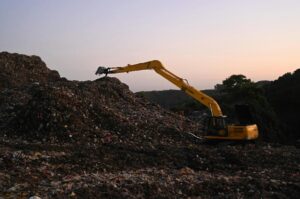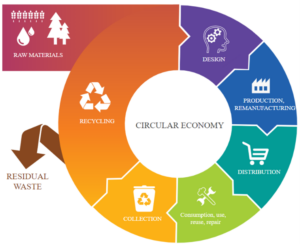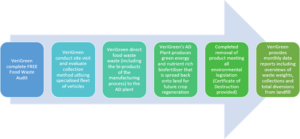In an era of heightened environmental consciousness and growing regulatory scrutiny, businesses are increasingly seeking sustainable solutions to manage their commercial food waste. Food waste, a significant contributor to greenhouse gas emissions and landfill strain, demands a proactive and environmentally responsible approach.
In this blog, we will delve into the intricacies of commercial food waste management, the environmental nuances, and the regulatory landscape. Let us break down the complexities into digestible insights, unveiling how Verigreen’s approach aligns with the principles of environmental sustainability and resource efficiency.
Understanding the True Cost of Mismanaged Waste
The Environmental Impact of Landfill Disposal
The sheer volume of total edible food waste generated annually is staggering – 1.3 billion tonnes globally, according to the Food and Agriculture Organisation of the United Nations (FAO). This not only represents a loss of valuable resources but also poses significant environmental threats.
When food waste decomposes anaerobically in landfills, it releases potent greenhouse gases, notably methane, intensifying the impacts of climate change, as highlighted by the Intergovernmental Panel on Climate Change (IPCC). At Verigreen, we recognise the urgency of diverting food waste from landfills to mitigate this impact.

Verigreen’s circular economy approach tackles this challenge head-on, diverting food waste from landfills and transforming it into renewable energy and nutrient-rich fertiliser. This strategy not only mitigates the environmental impacts of food waste but also creates valuable resources for society, fostering a more sustainable and circular food system.
Another critical issue with landfill disposal is the risk of soil and water contamination caused by leachate. This toxic liquid results from the breakdown of waste and can infiltrate surrounding ecosystems. Verigreen’s circular economy strategy mitigates this risk by transforming organic waste into nutrient-rich fertiliser via their unique closed-loop process. This repurposing not only eliminates the risk of contamination but also contributes to sustainable agricultural practices.
Regulatory Implications
Governments worldwide are recognising the urgency of addressing food waste, introducing regulations to curb its environmental impact. In Wales, for example, the Environment Act and Food Waste Law mandate specify food waste management practices for businesses, emphasising the need for responsible and sustainable disposal methods. Compliance with these regulations is crucial to avoid fines and reputational damage, ensuring businesses align their operations with evolving environmental standards.
By partnering with Verigreen, organisations can navigate the complexities of food waste regulations with confidence, staying ahead of the curve and demonstrating their commitment to environmental responsibility.
Compliance Challenges
Verigreen understands the financial challenges businesses face in adapting to new regulations. Our comprehensive food waste management solutions are not only environmentally friendly but also cost-effective. By implementing efficient food waste collection, separation and recycling processes, businesses can significantly reduce disposal costs while adhering to regulatory standards.
Regulatory landscapes for food waste management are continually evolving. Organisations must navigate these complexities to ensure compliance and environmental responsibility. Verigreen, part of the Heathcote Holdings Group of companies, is well-versed in tackling these food waste challenges, providing businesses with a partner that understands and adapts to the everchanging food waste regulatory landscape.
In addition to standard food waste disposal regulations, there is a growing emphasis on circular economy practices. Governments around the world are encouraging businesses to adopt circular approaches, promoting the repurposing of waste into valuable resources. Verigreen’s strategy aligns seamlessly with this, offering organisations an avenue to contribute to sustainability while meeting compliance requirements.
Partner with Verigreen for all your Food and Drink Waste Management

The circular economy could unlock $4.5 trillion of value by 2030. Image: European Parliament
Tailored Waste Solutions
One size does not fit all when it comes to food waste management. Verigreen collaborates closely with industries and their sister companies to understand the unique challenges and opportunities within each sector. Whether you are a food manufacturer, processor, grower, or wholesaler, our solutions are tailored to your industry. Customised food waste management plans ensure that organisations can optimise their processes effectively.
Closing the Loop Responsibly
The World Economic Forum defines a circular economy as when products are “made and consumed in a way that minimises our use of the world’s resources, cuts waste and reduces carbon emissions. Products are kept in use for as long as possible, through repairing, recycling and redesign – so they can be used again and again.” Embracing the circular economy is not just a trend; it is a responsible approach to resource utilisation. Our anaerobic digestion process plays a pivotal role in closing the loop on organic waste. By transforming food waste into biogas for energy and nutrient-rich fertilisers for agricultural use, we minimise waste and maximise value. Our responsible closed loop process benefits both businesses and the environment across every stage of the value chain, fostering a responsible and impactful food waste management strategy.
Verigreen’s Waste-to-Energy Approach

- Free Waste Audit: Begin the journey by connecting with Verigreen’s experts. Explore customised solutions tailored to your specific industrial waste challenges.
- Compliance Checkpoint: Ensure your organisation stays in tune with regulatory requirements by partnering with Verigreen. Navigate the compliance landscape with confidence.
- Embrace the Circular Approach: Engage with Verigreen to turn your industrial by-products into strategic assets and avoid disposing food waste into landfill. Contribute to a more sustainable and responsible future by adopting circular economy practices.
Verigreen’s commitment to turning industrial food waste into value is more than a solution; it is a strategic conversation. Embrace the circular economy, meet compliance standards, and engage in the transformative power of turning waste into energy.
Verigreen’s food waste management solutions offer businesses a pathway to not only comply with regulations but also thrive in a sustainable future. By understanding the true cost of mismanaged food waste, adapting to regulations with cost-effective solutions, and engaging in a strategic partnership with Verigreen, businesses can contribute to a circular economy where waste is transformed into value. Choose Verigreen and be a part of the solution to create a more sustainable and environmentally friendly future.
Contact Verigreen today to explore how they can assist your business in reducing food waste, comply with food waste regulations, and demonstrate your commitment to a sustainable future.
